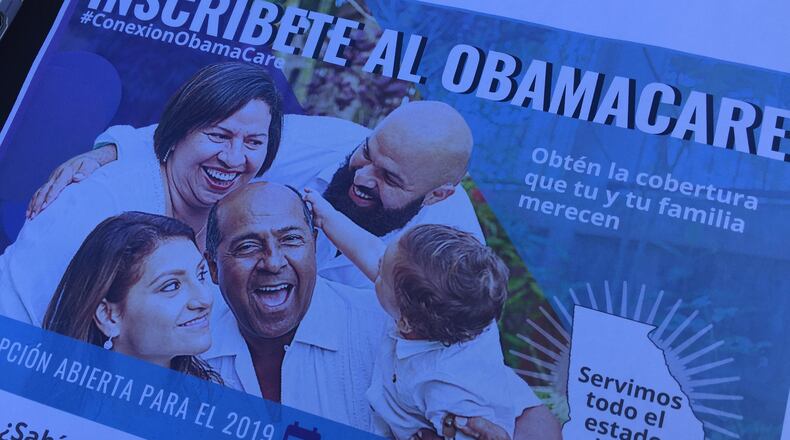Open enrollment is approaching again for the market where nearly half a million Georgians get their health insurance, the Affordable Care Act exchange.
And Georgians looking for insurance under the ACA, also known as Obamacare, will again have navigators to help them through the process, funded by the federal government. But there’s a big change in which ones.
Last year’s navigator group in Georgia, which focused on the immigrant population, lost out. This year the $550,000 allocated for Georgia will all go to the state’s network of federally funded clinics used by low-income patients, the Georgia Association for Primary Health Care.
Fred Ammons, the CEO of the Macon-based Community Health Works, said he was glad to see the news. With the assistance money well below what it had been under the Obama administration, this was the best of an unfortunate situation, he said.
“There’s no money for the sort of outreach that used to happen” when Ammons oversaw a subsidiary, Insure Georgia, that got federal funding to staff an 800-number phone bank year-round, run media ads and host pop-up information tables reaching every county in the state.
“Through the use of their (clinic) members, they have a very good geographic footprint throughout the state,” Ammons said of the winner. “If someone’s going to get it and work on it, they’re probably better positioned than the previous folks to reach a wider swath of uninsured Georgians.”
The winning group, the GAPHC, would not comment. It said federal authorities would allow it to speak about its program after an orientation next week.
After severe cuts under the Trump administration, the funding for assistance has stabilized, increasing by $50,000 this year.
Last year the federal Centers for Medicare and Medicaid Services cut the funding for Georgia assistance from $1.4 million to $499,000. The two organizations that previously led the assistance effort in Georgia, the GAPHC and Insure Georgia, were defunded. The entire pot went, instead, to Georgia Refugee Health and Mental Health, a small Clarkston-based nonprofit.
The Clarkston group’s founder, Kathleen Connors, had applied for a grant as usual that year but told The Atlanta Journal-Constitution that she was “a little astounded” to wind up the lone winner responsible for the entire state. It was a steep learning curve, and some of the “partners” the group listed in its application had not yet agreed to cooperate. Some of those didn’t.
But others did. The group hired experienced and motivated help, and it launched two websites for Spanish- and English-language assistance. Connors described successes including much-needed outreach into the Latino population both in metro Atlanta and statewide.
She said her group’s final sign-up numbers per dollar far outstripped any other group’s. (The other groups dispute the feds’ calculations because they record only a portion of the enrollees that the navigators assisted.)
Meanwhile, Connors’ group was grappling with an environment where large numbers of people, according to surveys, believed the ACA no longer existed after watching the GOP’s prominent attempts to repeal it.
“I seriously can’t believe this,” said Connors, upon learning from a reporter that her group was not chosen. “I wonder why they would select someone with such a poor track record and de-select someone with a substantial and successful record.”
She added: “My only interpretation is that, gee, they don’t want the most effective agency in getting health care for Georgians. They want one that’s not associated with the kinds of left-behind people we’re associated with.”
The CMS had asked applicants to focus on populations “left behind” by previous outreach efforts. Connors’ group this year had proposed to add a focus on rural residents in South Georgia and HIV-endangered patients, she said.
The federal agency said it evaluated each applicant on a point system and selected the one with the highest ranking.
In the end, last year’s marked overall decline in Georgia enrollees, from 481,000 to 458,000, could be due to any number of factors. There was the widespread misunderstanding about whether the GOP had succeeded in its repeal efforts. There was the big drop in funding for assistance overall, which made radio and TV advertising impossible to fund.
And it was the second year when the enrollment period was cut short, from three months to a month and a half. Georgia qualified for an extension of that period, but the CMS waited days until after the extension began before confirming there was more time for Georgians to take advantage of it.
ACA OPEN ENROLLMENT
Enrollment for plans covering 2020 runs six weeks, Nov. 1-Dec. 15.
Ground zero for signing up is the federal sign-up center, Healthcare.gov or CuidadoDeSalud.gov.
The federal phone number is 1-800-318-2596.
Insuring Georgia is a nonprofit health insurance agency that will assist in ACA enrollment. It is at InsureGA.org and 1-866-988-8246.
The federally funded group that will help Georgians sign up this year is a statewide collection of federally qualified health centers, or FQHCs. The umbrella group for ACA assistance does not yet have information on sign-up.
Stay on top of what’s happening in Georgia government and politics at www.ajc.com/politics.
About the Author
Keep Reading
The Latest
Featured



